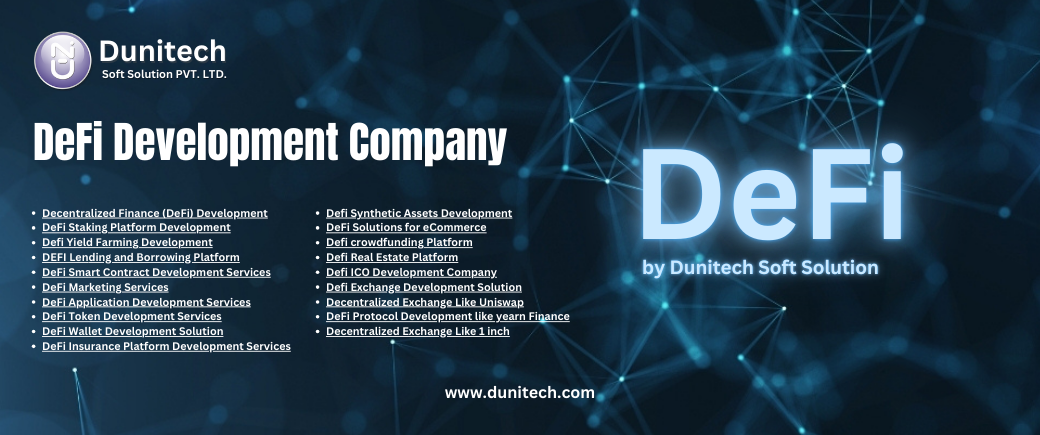As decentralized finance (DeFi) continues to gain traction, offering innovative financial services without the need for intermediaries, the importance of risk management has never been clearer. With the rapid growth of this space comes a unique set of risks, making DeFi insurance an essential component of the ecosystem. At Dunitech Soft Solutions, we recognize that understanding DeFi insurance is crucial for investors, developers, and users alike. In this guest blog, we will explore what DeFi insurance is, its benefits, the challenges it faces, and its potential to secure the future of decentralized finance.
What is DeFi Insurance?
DeFi insurance provides coverage against various risks associated with decentralized finance platforms. Unlike traditional insurance, which often relies on centralized authorities, DeFi insurance operates through smart contracts on blockchain networks. This structure ensures greater transparency, faster claims processing, and reduced costs. Users can protect themselves from risks such as smart contract vulnerabilities, protocol hacks, and other unforeseen events that could jeopardize their investments.
Key Features of DeFi Insurance
1. Smart Contracts for Automation
At the core of DeFi insurance are smart contracts, which automate the claims process. When specific conditions are met—like a security breach or a contract failure—these self-executing contracts facilitate immediate payouts to users. This automation drastically reduces the time and complexity involved in traditional insurance claims.
2. Community-Driven Governance
Many DeFi insurance platforms utilize decentralized governance models, allowing users to have a say in decision-making processes. This participatory approach enables users to evaluate risks and determine policy terms, creating a sense of community ownership and enhancing trust in the system.
3. Flexible and Customizable Policies
DeFi insurance products often offer a range of customizable policies tailored to individual user needs. Whether you are a retail investor or a large liquidity provider, you can select coverage options that align with your specific risk profile and investment strategy.
Benefits of DeFi Insurance
1. Enhanced Security and Peace of Mind
DeFi insurance provides users with peace of mind, allowing them to engage with decentralized finance more confidently. Knowing that their assets are protected against potential losses encourages broader participation in the DeFi ecosystem.
2. Encouraging Innovation and Adoption
As users become more secure in their investments, we can expect an increase in the adoption of DeFi platforms. This growth will foster innovation, leading to the development of new financial products and services that can benefit the entire ecosystem.
3. Transparency and Trust
DeFi insurance operates on public blockchains, ensuring that all transactions are verifiable. Users can easily track policy terms, claims, and payouts, which builds trust and transparency within the community.
Challenges Facing DeFi Insurance
1. Regulatory Uncertainty
The DeFi space is still navigating an evolving regulatory landscape. Uncertainty around regulations can hinder the growth of DeFi insurance, as providers seek to comply with varying requirements in different jurisdictions.
2. Complexity of Risk Assessment
The fast-paced nature of DeFi means that new vulnerabilities can emerge quickly. Accurately assessing risks associated with various protocols can be challenging, requiring constant vigilance and adaptation from insurance providers.
3. Limited User Awareness
Many potential users remain unaware of DeFi insurance options or how they work. Increasing education and awareness about DeFi insurance is crucial for driving adoption and ensuring users can make informed decisions regarding their financial security.
The Future of DeFi Insurance
As the DeFi ecosystem matures, the future of DeFi insurance looks promising. Ongoing innovations aim to address current challenges, including the development of more sophisticated risk assessment tools and a wider range of coverage options. Additionally, as regulatory frameworks become clearer, we can expect increased legitimacy and trust in DeFi insurance products.
At Dunitech Soft Solutions, we are dedicated to exploring the opportunities presented by DeFi insurance. By integrating effective insurance solutions, we can contribute to a more secure and resilient DeFi ecosystem, enabling businesses and individuals to thrive in this exciting new financial landscape.
Conclusion
DeFi insurance is a vital component of the decentralized finance landscape, providing essential protection as users navigate the complexities of this innovative space. By enhancing security, fostering transparency, and offering customizable coverage, DeFi insurance builds trust and encourages broader participation in decentralized finance. As we look to the future, Dunitech Soft Solutions is committed to supporting the growth and development of DeFi insurance, ensuring that users can confidently explore the vast opportunities this revolutionary financial ecosystem has to offer.






Comments